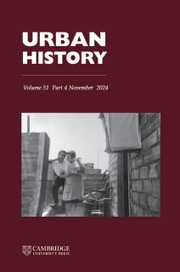Article contents
Current trends in nineteenth- and twentieth-century Spanish urban history
Published online by Cambridge University Press: 23 February 2004
Abstract
It is now several years since José Luis Oyón presented an overview of recent trends in Spanish urban history, and this article seeks to communicate a sense of developments in the field since the mid-1990s, dealing with publications covering the nineteenth and twentieth centuries: ‘contemporary’ rather than ‘modern’ history, in Spanish terminology. The question of what constitutes ‘urban history’ in Spain remains problematic, in the absence of a ‘Dyos phenomenon’, a distinctive urban history teaching enterprise and a sustained and successful dedicated journal. Four annual issues of Historia Urbana, a ‘review of the history of ideas and of urban transformations’, appeared in the mid-1990s, but the final one dates from 1997, and most of the articles presented general theoretical perspectives or articles based on research in countries other than Spain. As Beascoechea and Novo have recently remarked, it seemed in the early 1990s that urban history (or, as they put it, ‘the history of the city’) was becoming established as a recognized discipline in Spain, but subsequent developments have failed to match the expectations that were aroused. Their themed urban history issue of Historia Contemporánea, produced in 2002, is aimed at regaining the lost momentum. Meanwhile, librarians still do not respond to ‘historia urbana’ as a category, seeking to redefine it as ‘urbanismo’, a narrower concept focused on town planning and urban design.
- Type
- Review Essay
- Information
- Copyright
- 2003 Cambridge University Press
- 2
- Cited by


